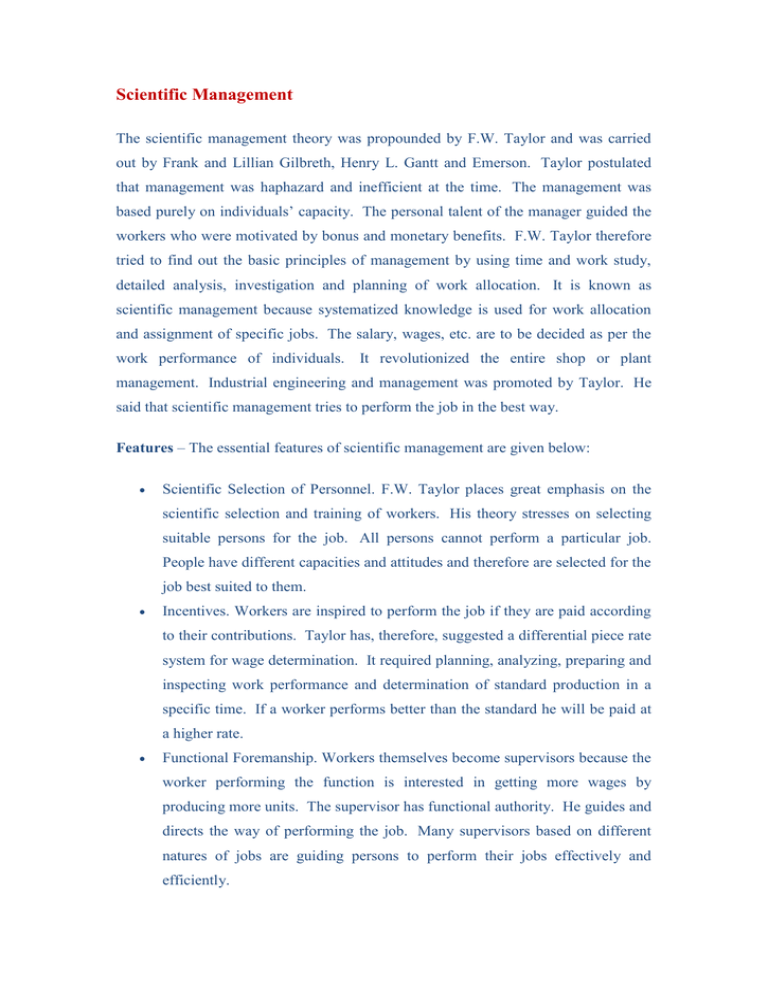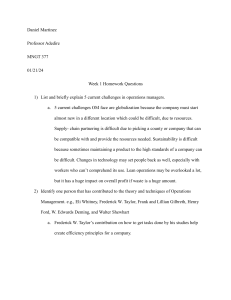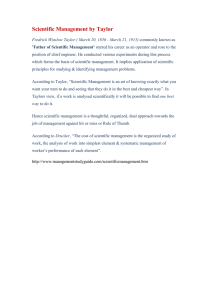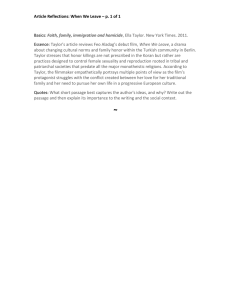Scientific Management
advertisement

Scientific Management The scientific management theory was propounded by F.W. Taylor and was carried out by Frank and Lillian Gilbreth, Henry L. Gantt and Emerson. Taylor postulated that management was haphazard and inefficient at the time. The management was based purely on individuals’ capacity. The personal talent of the manager guided the workers who were motivated by bonus and monetary benefits. F.W. Taylor therefore tried to find out the basic principles of management by using time and work study, detailed analysis, investigation and planning of work allocation. It is known as scientific management because systematized knowledge is used for work allocation and assignment of specific jobs. The salary, wages, etc. are to be decided as per the work performance of individuals. It revolutionized the entire shop or plant management. Industrial engineering and management was promoted by Taylor. He said that scientific management tries to perform the job in the best way. Features – The essential features of scientific management are given below: Scientific Selection of Personnel. F.W. Taylor places great emphasis on the scientific selection and training of workers. His theory stresses on selecting suitable persons for the job. All persons cannot perform a particular job. People have different capacities and attitudes and therefore are selected for the job best suited to them. Incentives. Workers are inspired to perform the job if they are paid according to their contributions. Taylor has, therefore, suggested a differential piece rate system for wage determination. It required planning, analyzing, preparing and inspecting work performance and determination of standard production in a specific time. If a worker performs better than the standard he will be paid at a higher rate. Functional Foremanship. Workers themselves become supervisors because the worker performing the function is interested in getting more wages by producing more units. The supervisor has functional authority. He guides and directs the way of performing the job. Many supervisors based on different natures of jobs are guiding persons to perform their jobs effectively and efficiently. Specialization. Specialization is developed in scientific management. It points out the managerial and non-managerial functions. Persons capable of managing functions are given the jobs of planning and control, while workers with the capacity for work performance are put into production. Coordination. Since the jobs are performed by different specialized persons, coordination of their activities becomes essential. The management should organize the activities in such a way that it can perform its activities effectively. Coordination between workers and managers as well as amongst themselves is essentially performed in scientific management. Economic Performance. Workers are considered economic beings. They utilize physical resources in the best manner possible in order to get maximum production out of human and physical resources. Work Order. Workers perform their jobs in a systematic order. The raw materials, machine and the time are used in a systematic way. This helps workers achieve maximum utilization of the capacities and resources available to them. The materialistic approach is always visible in the work order. Frank and Lillian Gilbreth experimented with the motion study produced by F.W. Taylor. They studied time and fatigue involved in work and concluded that job simplification, meaningful work standard, and incentive wage plans were necessary. Frank is called ‘the father of motion study’. Henry L. Gantt made some important contributions to scientific management such as comparing plans with performance, task and bonus remuneration, teaching and training workers and laying emphasis on services carried out by workers. H. Emerson contributed efficiency engineering development at work. He emphasized the need for educating workers to increase their efficiency in production, which would benefit the employees as well as the management in the long run. MBA - Knowledge base




